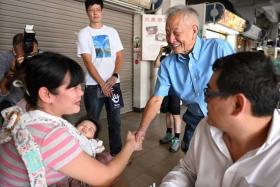Abe's gamble may pay off, surveys show
TOKYO: Prime Minister Shinzo Abe's snap election gamble may pay off after media forecasts showed his ruling bloc heading for a surprisingly big win, possibly enough to re-energise his push to revise Japan's post-World War II pacifist constitution.
A hefty victory in the Oct 22 poll would raise the likelihood that his Liberal Democratic Party (LDP) will retain Mr Abe as its head for a third term next year.
With 10 days still to go, sources warned there was still room for a slip up, as about half the voters surveyed remained undecided.
For now, projections by the Nikkei business daily, Yomiuri newspaper and Kyodo news agency showed Mr Abe's conservative LDP-led coalition on track to win close to 300 or more seats in the 465-member lower House, improving the majority it held in the last Parliament.
The LDP alone could win about 288 seats, or about the same as before dissolution, Kyodo forecasted.
"The scramble gamble paid off for Abe," said Mr Jesper Koll, head of equity fund WisdomTree Japan. "If the LDP gets 250 to 280 seats, he is safe."
With no election needed until late next year, some analysts had predicted Mr Abe might regret his early bid for a fresh mandate.
But his main challenger, Tokyo Governor Yuriko Koike's fledgling conservative Party of Hope, appeared to be struggling despite calls for popular policies, such as an exit from nuclear power and a sales tax hike freeze.
The month-old Hope party appeared set to win about 69 seats, with a range of 46 to 110, the Nikkei said.
Mr Abe called the snap election amid disarray in the opposition camp and after an uptick in his ratings, which had been hurt earlier this year by scandals over suspected cronyism.
He has called his "Abenomics" recipe of hyper-easy monetary policy, fiscal spending and promised structural reforms a success.
And yesterday the stock market welcomed expectations that his reflationary policies would continue, with the Nikkei index hitting its highest level since December 1996. - REUTERS
Get The New Paper on your phone with the free TNP app. Download from the Apple App Store or Google Play Store now


